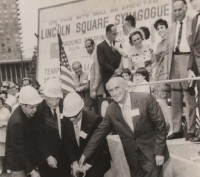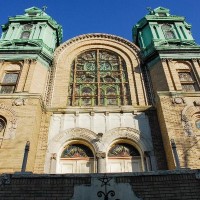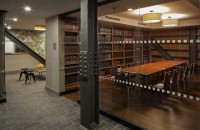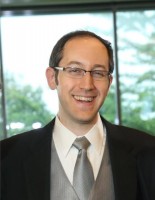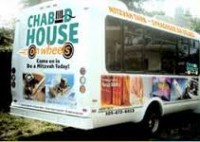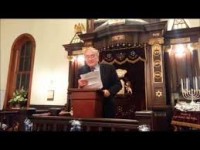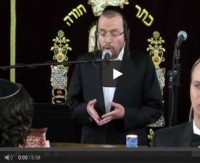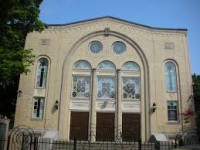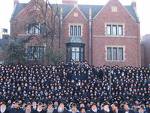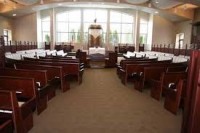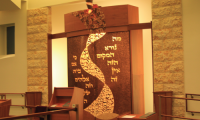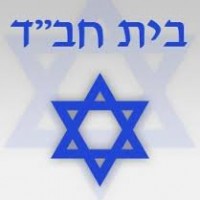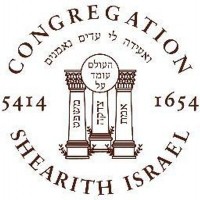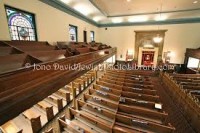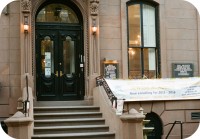LSS is a diverse and vibrant Modern Orthodox Congregation that provides religious, social, and educational services and outreach to the unique Jewish community of the Upper West Side. The synagogue strives to be a model in the integration of Halachic Judaism and contemporary life to the broader Jewish community.
In 1964, in the living room of an apartment in Lincoln Towers, a part-time rabbi from Yeshiva University named Steven Riskin took the budding Lincoln Square Conservative Synagogue by storm. His originality, charm and boundless energy captivated members and moved them to a more traditionally observant Judaism, in turn sparking a growing Jewish renaissance on Manhattan’s Upper West Side.
Before long, a new synagogue-in-theround made its debut at 200 Amsterdam Avenue, and the excitement at the renamed Lincoln Square Synagogue brought hundreds of young single professionals to the neighborhood, creating a vibrant scene for mixing and matching. Young families were also drawn to LSS, attracted by the dazzling teachings of Rabbi Riskin, assisted by Rabbi Herschel Cohen z”l and Rabbi Ephraim Buchwald, and the gorgeous melodies of Cantor Sherwood Goffin. “The New Orthodox” they called it on the cover of New York Magazine. Who knew? But as members struggled to navigate between the laws of Jewish tradition and the secular values of the surrounding society, Lincoln Square Synagogue began to see its destiny.
Just down the street from the temples of high culture at Lincoln Center, Lincoln Square Synagogue quickly established itself as a temple of an innovative kind, showcasing the classical and the contemporary, history and modernity. With joy and pride, the challenges of present-day living were brought into harmony with the ancient traditions passed down through the generations. The sacred liturgical texts of tefillah were infused with a new vitality as haunting, time-honored melodies shared the stage with the music of Shlomo Carlebach and The Rabbi’s Sons. The thirst for wisdom was quenched with the scholarship of Rashi and Rambam blended with the insights of 20th-century thinkers like Rabbi Abraham Isaac HaCohen Kook and Rabbi Joseph Dov HaLevi Soloveitchik. Everything old was new again.
What emerged was a synagogue with its own, unique, invigorating rhythm: home to meaningful and enthusiastic worship, to be sure, but also a place to establish lifelong friendships, build businesses and organizations, find soul mates and nourish the next generation through education and religious instruction. Thousands of Jews of all ages and backgrounds had come together to create a true makom kadosh, providing support for each other in times of sorrow and sharing joy in times of simcha. LSS was now a unified community whose commitment to Judaism and love of humankind extended beyond self and family to the world at large. You could walk in off the street for the first time, as so many did, and feel you’d been here before.
As the years flew by, the stunning success of Lincoln Square Synagogue brought with it newfound responsibility: to meet the needs of an increasingly diverse membership, an ever-expanding neighborhood and a 21st-century world. New solutions for new realities were required that would acknowledge the changing landscape, while staying true to the synagogue’s core principles and personality. Recognizing the difficulties faced by those forced to care for their children and their parents at the same time, and those older members in need of help, LSS became the first local Orthodox synagogue to add a part-time social worker to its core staff, guiding those needing support and companionship through the complicated maze of social service programs.
Identifying a resurgent thirst for Torah study on an individual, one-on-one level, LSS members founded the first full-time Modern Orthodox/Religious Zionist Kollel in the New York metropolitan area, offering the learned and the uninitiated new and exciting educational opportunities that reflected a love of Torah as well as eretz yisrael and am yisrael – the land and the nation of Israel.
And always mindful of the needs of the greater Jewish community, LSS members created the Lea Segre Tomchei Shabbos Fund providing free meals to those recovering from illness and childbirth or sitting shiva, as well as the Louis Lazar Benevolent Fund providing free religious articles like siddurim, mezuzot, and tefillin to those in need. All of this and weekly Bikur Cholim visits to Roosevelt Hospital every Shabbat afternoon, annual clothing drives, and a dedicated Chesed Fund that supports a variety of charitable causes in New York and across the country. As our sages teach, “olam chesed yibaneh” – acts of kindness build the world – and Lincoln Square Synagogue always does its part.
In 2013, LSS continued the next phase of its history and moved 100 yards south to 180 Amsterdam Avenue.
Founded in 1906, Congregation Mount Sinai is the oldest continuously operating synagogue in Jersey City. Our distinctive building with its copper cupolas is a historic landmark and a symbol of our deep roots in the neighborhood. Services are held 10 a.m. Saturday and are conducted in Hebrew.
Men and women sit separately, and children are welcome. Join us for Shabbos or a holiday or contact [email protected] for more information.
Congregation Mount Sinai, founded in 1906, is the oldest continuously operating synagogue in Jersey City. Our distinctive building with its copper cupolas is a historic landmark and a symbol of our deep roots in the neighborhood.
We are a warm, welcoming, and traditional congregation with a modern perspective on Jewish life and learning. Members include longtime Jersey City families as well as newcomers of all ages who are participating in the economic and cultural revival of Jersey City and Hudson County.Visitors are likely to hear a wide variety of
languages and accents as our congregation is exceptionally international. Page numbers are always indicated, and we offer a welcoming environment for people to express, deepen and rediscover their Jewish heritage.
Founded largely by Jewish merchants who anchored the Central Avenue retail district, Congregation Mount Sinai flourished in the mid-20th century. At the time, The Heights was home to many first and second-generation American Jews.
During the 1960s and 1970s, many members moved to the suburbs but the area is being rediscovered by a new generation.
We are walking distance from Journal Square, Hoboken and Union City. During the week, The Heights is a quick commute to New York with easy access to the Light Rail, PATH trains, buses, jitneys, and Uber. Other highlights include the Central Avenue shopping district, Pershing Field, and stunning panoramic views of Manhattan from Fisk Park/Riverview Park.
בבית חב"ד תמצא בית כנסת, הכנה לנישואין, שיעורי יהדות אישיים, בדיקת תפילין ומזוזות, שיעורי תורה לגברים ונשים, סידור קידושין, שירותים/השאלת מזוזות.
Chabad House Bowery is enabling and inspiring young Jews to take responsibility for creating a bright personal and communal Jewish future.
We are building a movement to bring healing to the world.
Our vision is for Chabad House Bowery to carry out the Jewish mission with boundless love, deep inspiration, creativity and style.
Rabbi Yosie Levine joined The Jewish Center's rabbinic team in 2004. He earned a BA in English and Comparative Literature from Columbia College and was awarded the university's William F. Curtis award for outstanding oratory. A Wexner Graduate Fellow, Rabbi Levine received rabbinic ordination from the Rabbi Isaac Elchanan Theological Seminary and was the winner of RIETS' writing prize. He holds an MPA in Public Policy from NYU's Robert F. Wagner Graduate School and is currently pursuing a doctoral degree in Modern Jewish History at Yeshiva University's Bernard Revel Graduate School. Rabbi Levine served as Rabbinic Intern, Assistant Rabbi and Associate Rabbi at The Jewish Center where he received practical rabbinic training and mentoring from Rabbi Ari Berman. Before joining the Center, he served as the educational director of the Lauder Foundation's Beit Midrash in Berlin, Germany and as the visiting scholar of Congregation Knesseth Israel in Birmingham, Alabama. Rabbi Levine has taken a leadership role on the issue of day school affordability and serves as the chair of Manhattan Day School's Political Advocacy Committee. He is co-chair of the Manhattan Eruv and is active in numerous communal organizations including AIPAC and the Beth Din of America and serves on the Board of UJA-Federation of New York. Rabbi Levine's wife, Rachel, is a clinical psychologist in private practice in Manhattan. They are the proud parents of Akiva, Yehoshua, Ari and Judy.
Rabbi Dovid Zirkind, a native of Baltimore, Maryland, joined The Jewish Center clergy in July 2012. After two years of study at Yeshivat Kerem B’Yavneh in Israel, Dovid continued his education at Yeshiva University. There he received his undergraduate degree in Psychology, graduating from the Yeshiva Program with honors. Upon graduation, Rabbi Zirkind attended the Rabbi Isaac Elchanan Theological Seminary, studying in the Marcos and Adina Katz Kollel. In 2010, Rabbi Zirkind joined the Yeshiva University Torah MiTzion Beit Midrash of Toronto, where he studied full time in the Beit Midrash and served as Rabbinic Assistant at Shaarei Shomayim Congregation. In that role, Rabbi Zirkind taught classes throughout the Greater Toronto Area, crafted programs and curricula for adults, college students and children alike and trained under a number of the communities leading Rabbis.
In his role as Assistant Rabbi of The Jewish Center, Rabbi Zirkind services the full gamut of our membership. He is the director of our Adult Education program, Jewish Center University, leads our daily minyanim and heads our Young Leadership Minyan and programming. Internally, Rabbi Zirkind teaches a number of ongoing classes and shiurim, including Talmud, Contemporary Ethics and Jewish Law. He believes that passionate Torah Study should be text based, highly engaging and grapple with the major issues of our time. In the broader community, Rabbi Zirkind increasingly represents our shul as well. He is teacher at Manhattan Day School and a frequent lecturer in local institutions including; the JCC, West Side Sefardic Synagogue, Congregation Rodeph Shalom, the RIETS Rabbinic Training Seminar and others. In addition, as a UJA Federation Grant Recipient, Rabbi Zirkind currently leads the inaugural cohort of The Jewish Center Social Action Fellowship (JCSAF). Together with his wife, Ariella, the Zirkind’s lead sought after personalized marriage workshops, which include Chattan & Kallah classes and ongoing Taharat HaMishpacha and fertility counseling for young families.
Young Israel: Past, Present and Future
"The aims and purposes of the organization shall be to foster and maintain a program of spiritual, cultural, social and communal activity towards the advancement and perpetuation of traditional Torah-true Judaism; and to instill into American Jewish youth an understanding and appreciation of the high ethical and spiritual values of Judaism and demonstrate the compatibility of the ancient faith of Israel with good Americanism.
The organization shall promote cooperation among the constituent branches now existing and which may hereafter be formed, establish a close bond of kinship to the end that their individual and common problems may more easily be solved, and act as the federated and central body for the Young Israel Movement so that its influence as a force in Jewry may be felt and recognized in America and the world over."
(from the Preamble of the National Council of Young Israel Constitution)
Young Israel was born in 1912, when the primary aspirations of most American-born Jews were economic success and acceptance in American society. Jewish education was very low on their list of priorities, and as a result, was usually rudimentary, at best. Orthodox synagogues were exclusively Yiddish-speaking and permeated by an Eastern European atmosphere. American-raised Jewish youth who wandered into these synagogues typically found themselves shut out completely. It is not surprising that the Jewish youth of that era generally avoided the synagogue, attending only when expected by family custom. Although intermarriage was relatively rare, the distance between young Jewish hearts and minds and Jewish belief and practice was almost huge. It was in this environment that Young Israel was founded by a group of 15 visionary young men and women.
Its first activities were Friday night lectures in English (which was very controversial) on a variety of topics of Jewish interest. Three years later, the group formed a "Model Synagogue" with innovations designed to attract American-raised English-speaking Jewish youth, including participatory singing and youth programs. To enable people of all means to fully participate in synagogue services, Young Israel prohibited the auctioning of synagogue honors. The National Council of Young Israel required the minimum halachic standards of a mechitza, closed parking facilities on Shabbat and Yom Tov, and that each of its synagogues officers be Shomer Shabbat. Young Israel synagogues popped up across North America.
Young Israel envisioned itself as much more than a conglomeration of synagogues. Young Israel was the first on secular college campuses, with over 20 kosher dining halls and intercollegiate programs. Young Israel created an Employment Bureau for Sabbath Observers, in an era when most employees were expected to work 6 days a week. At Young Israel’s headquarters in New York, arms were packed for the Haganah defense forces of the not-yet-born State of Israel. The Free Soviet Jewry Movement was championed by the leadership of Young Israel. Young Israel has always been fiercely Zionistic, and promoted the rights of Jews to live throughout the Land of Israel. Young Israel placed an important role in gaining broad acceptance for advocating for the commuting of Jonathan Pollard’s sentence.
Today the National Council of Young Israel provides professional advice and cost-saving initiatives to 135 Young Israel synagogues (and beyond), advocates for the interests and views of our 25,000 member families, trains aspiring rabbis, supports rabbis in the field with biweekly question and answer sessions, aides communities in rabbinic searches and relations, coordinates informative Gabbai2Gabbai conference calls, provides exciting Parsha Nation curriculum for synagogue youth groups, runs inspiring Achva Summer Teen Experiences, shares best practices through monthly e-publications Shul Solutions and The Practical Pulpit, runs a three division basketball league in the New York metropolitan area, and serves as the sponsor of four senior centers at Young Israel synagogues which feed, educate and recreate the generation that made Young Israel great.
Future plans include providing spiritual inspiration and connection for Young Professionals and training Ashkenazic rabbis how to serve their Sephardic congregants. We are committed to work to maximize the resources of the Jewish community by working with our colleagues at other Jewish organizations and Jewish institutes of higher education and to maintaining a standard of excellence in everything we do.
Historic Shaare Zedek Synagogue
For over a century, Congregation Shaare Zedek has served the Orthodox Jewish community
of northern Hudson County in New Jersey, including West New York, Guttenberg, North Bergen, Weehawken and Union City.
In 2012 we celebrated our Centennial. Some of our families have been with us since the beginning over a hundred years ago.
If you are part of our history, we invite you to contribute your story to our virtual book.
If you are new to Shaare Zedek we welcome you with open arms.
The synagogue is temporarily closed while we fix some building code violations and settle some fines.
When we reopen, we have services on Shabbat at 9:30 AM, and also on Jewish holidays.
We often have maariv on Friday – call us to check on the status: (201) 867-6859
Start the year on a
HIGH note!
High Holiday Services at
Chabad House in Miami Beach
Rosh Hashana 5776 – 2015 – September 13 -15
Yom Kippur – Sept 22-23
Chabad invites you to a warm, traditional, uplifting, and meaningful High Holiday experience.
Our doors are open to all; no membership fees or tickets.
Warm, friendly and non-judgmental atmosphere
No background, affiliation or prior knowledge necessary.
Hebrew-English Holiday Prayer Books
Traditional services blended with contemporary messages
Prayer instructions throughout the service
Insights and explanations into the Prayers, practices and rituals and inspirational stories
Festive Holiday Meals
Reserve Now for Amazing Rosh Hashana Dinner
All services are free of charge Donations are encouraged and warmly appreciated
No tickets required. Reservations are appreciated for Services, required for Festive Holiday Meals.
Everyone is invited, and no one will be turned away for lack of funds. Main thing is you come, and we are waiting to see you!
We look forward to personally greeting you!
SpatzShulPhoto tinyWe are an independent, historic Orthodox synagogue that serves a diverse congregation and the broader community.
Our little shul is a great place for davening (prayer), learning, and spiritual growth; and a social environment where we celebrate holidays and life-cycle events together.
We are a warm, caring, welcoming community where everyone can contribute and be active in the life of the congregation, build on the traditions of our founders, and link the Jewish past to the future.
The Adams Street Shul is an orthodox synagogue located near Boston, Massachusetts. The congregation was founded in 1911 — and the shul built in 1912 — by immigrants who had been settling there since the 1890's, mostly from Hungary and the Ukraine.
The synagogue is located in the Nonantum neighborhood of Newton, less than five miles from downtown Boston. Newton is famously safe, and extremely convenient to all the Boston attractions, colleges, high-tech employment, and world-class medical centers.
The Adams Street Synagogue is also convenient to mikvaot and day schools, enjoys having an eruv, and often partners with the three other orthodox synagogues within walking distance.
In the last decade of the 20th century, the antique synagogue was physically restored, and its small, vibrant congregation has been growing ever since.
The shul's members benefit from Newton's excellent municipal services. The shul's Nonantum neighborhood has more homes for rent, more two-family homes, and lower cost houses than can be found in Brookline, Sharon, or other parts of Newton. And there is an eruv.
Individuals and young families relocating to the Boston area for its job market or educational opportunities find the Adams Street Shul to be a place where they can become active and really make a difference in a welcoming, haimish community.
The synagogue is listed on the National Register of Historic Places, and the congregation has been housed there continuously for over a century.
For more information, explore the synagogue's website or contact to arrange a tour or Shabbat hospitality.
Join our diverse congregation, over one hundred years old and still going strong!
Rabbi Ben Skydell has been the rabbi at Congregation Orach Chaim since January 2013. He follows an illustrious tradition of major American Rabbis to have served as the Congregation’s Rabbi, including Rabbis Michael D. Shmidman, Kenneth Hain and Simon Langer.
A native of Manhattan’s Upper West Side, Rabbi Skydell is a graduate of Yeshiva College and the Rabbi Isaac Elchanan Theological Seminary. He is a long-time faculty member of the North Shore Hebrew Academy High School, and the Drisha Institute for Jewish Education, and taught for several years at Yeshivat Hadar. Rabbi Skydell also served on the rabbinic staff of Congregation Beth Sholom of Lawrence, New York for nine years.
Rabbi Skydell’s areas of interest include the intersection of Halacha and history, the spiritual worlds of mussar and hasidut, and the historical world of the Rabbis of the Talmud. Rabbi Skydell’s dynamic and engaging presentation has made him a sought-out speaker on college campuses throughout the United States.
Rabbi Skydell is married to Shani, a dedicated social worker and teacher. They are the proud parents of Hannah, Emmie and Zacky.
Cantor Yaakov Y. Stark has been described as possessing “a voice of great beauty, clear and true…breathtaking, radiant, as though from another world.” A child prodigy, at the mere age of seven Yaakov Yoseph Stark was already thrilling congregations with his heartrending solos on the High Holidays. His talent and ability were nurtured by the distinguished cantors in his family, and through continuously listening to the master cantors of the golden age: Rosenblatt, Hershman, Kwartin, Pinchik, Glantz and Koussevitzky. Huge crowds of people regularly attend to savor the stirring songs and timeless tefillos eloquently enhanced and warmly delivered by their beloved cantor. Cantor Stark was privileged to perform at numerous sold-out concerts with the most prestigious philharmonic orchestras and finest choirs throughout the world. His lyric tenor voice has put him in constant demand as a guest cantor in synagogues worldwide. Cantor Stark resides in Williamsburg, Brooklyn, with his wife and children.
Rabbi Shmidman has served the Orach Chaim congregation and Upper East Side community since 1988. In addition to Rabbinic ordination, he holds a Ph.D. degree in Public Law and Government from Columbia University. He has served as Professor and Chairman of Political and Social Science at City University of New York and most recently as Dean of Undergraduate Jewish Studies at Yeshiva University. A widely recognized scholar, he is acclaimed as an outstanding teacher and inspiring preacher. An ardent Zionist, he has been honored by religious, social and cultural institutions in Israel and the United States.
Professional Learning Communities (PLCs) are powerful tools for improving schools, classrooms and informal learning spaces. PLCs (and their equivalent Communities of Practice for communal workers) allow education professionals to network with their colleagues, share insights and provide support for each other. CJE convenes participants with shared expertise and experience to collaborate and ensure maximum efficiency.
CJE currently facilitates the following professional learning communities for Baltimore Jewish Day Schools:
- Guidance Counselors/Psychologists
- Facility Managers
- Information Technology Specialists
- Librarians
- Marketing Professionals
In addition, CJE facilitates a Community of Practice for Baltimore Jewish communal professionals working with families with young children.
Temple Beth Shalom, also known as the Tremont Street Shul, is a warm, friendly, traditional Jewish synagogue located near the center of Cambridge, Massachusetts. We embrace a wide variety of ages, backgrounds, and styles of worship. On Shabbat evening and morning we have two styles of services. Shabbat morning services are followed by a sit down Kiddush lunch to which everyone is welcome.
HISTORY
Temple Beth Shalom was formed when Temple Ashkenaz and Congregation Beth Israel merged in 1962. The merged Shul chose to use the Temple Ashkenaz building at 8 Tremont Street because it was newer. The name was changed to Temple Beth Shalom, in part to mark a new spirit of community cooperation.
As members of the original Cambridge Jewish community migrated to the suburbs, the synagogues in Cambridge consolidated in stages. The Tremont Street Shul was the last of original Shuls to remain in operation. In the 1970’s, all the local colleges decided to have a joint Simchat Torah celebration at TBS. Helped by the success of this annual event, the Shul began to attract new members from the young professionals in the greater Cambridge area and has grown steadily since then.
Our Shul underwent a major renovation in 1987. The basement vestry was made suitable for the Alef Bet child care center, which was founded at that time. A second renovation in 1994 transformed our balcony into a convertible classroom. A new office was added in 2004. Meticulous care was taken during each renovation to conserve our building’s historic character. We think our main sanctuary is one of the Jewish architectural jewels of the greater Boston area. Come and see for yourself!
The ancestors of Temple Beth Shalom include:
Congregation Anshai Sfard, organized 1896, chartered 1898, building at 83 Webster Ave., Somerville, merged into Beth Israel 1957
Congregation Beth Israel, organized 1900, building at 238 Columbia St.
Temple Ashkenaz, split off from Beth Israel over the issue of Ashkenazic vs. Sephardic ritual 1908, building at 8 Tremont St.– originally the home of Joshua Kaplan, house torn down and a new building erected 1924
Congregation Yavneh, chartered 1918, building at 8 Howard St. erected 1920, closed 1934.
For more information on our history and the history of Jews in Cambridge, see our on-line exhibit Centennial of the Jewish Community in Cambridge, an event we celebrated in 1996.
Temple Beth Shalom is a member of the Synagogue Council of Massachusetts.
ABOUT US
Reflecting the diverse population of Cambridge, Temple Beth Shalom represents a unique, creatively traditional approach to Judaism. Our goal is to make Jews of every affiliation feel at home. Impossible? Try us.
We have three styles of worship every Shabbat and two styles of weekday services. See the worship services page for more information on the styles available. Our minyanim come together later Saturday morning for a sit-down Kiddush. Our Kiddush includes a light lunch, singing, and much fellowship. All holidays are celebrated with services and appropriate observances.
We have an active 20s and 30s group that runs several social events every month.
The Temple hosts a number of educational activities, including the Alef-Bet Child Care, a Talmud class, and other adult education programs. Along with two other local congregations we support the Kesher after-school Hebrew School program.
A unique event at Beth Shalom is our famous erev Simchat Torah celebration which draws as many as 500 or more people. Part of the fun-filled service is the Hakafot, which takes the congregation out onto Tremont St. for singing and dancing well into the night. This service attracts a wide cross-section of the Greater Boston community, including special participation of local college Hillels.
Chabad of the Upper East Side is part of a world-wide organazation of Chabad-Lubavitch, under the leadership and guidance of the Lubavitcher Rebbe, Rabbi Menachem Mendel Schneerson.
There is no mystery about our philosophy: Love every Jew; educate every Jew; reach out to help every Jew. We open our arms and hearts to all, regardless of education or affiliation. That is a commitment that we have honored on the Upper East Side since 1993
Synagogue
Friday Evening
Mincha & Maariv:
5 minutes after candle lighting
Shabbat
9:00 AM: Chassidic Philosophy
9:30 AM: Morning Services
10:30 AM: Reading of the Torah accompanied by penetrating Chassidic insights into the Torah and it's relevance to our personal lives
Kids Shul: 10:15 AM -12:15 PM
with Mrs. Rivkah Dayan
Followed by Kiddush
Mincha, Seuda Shlishit followed by
Evening services, Havdallah and The Living Torah.
Call for exact times.
Sunday & Legal Holidays
The Upper East Side Kollel
Learning: 8:30 AM
Morning Services: 9:00 AM
followed by breakfast and 1:1* learning until 1:30 PM
Monday-Friday
The Upper East Side Kollel
6:45 1:1 Learning
7:30 AM – Morning Services
followed by breakfast and 1:1* learning until 12:30 PM
Jewish Identity Grows On Manhattan's Upper East Side
Marlene Rosenberg, a successful senior business management consultant has been living around the corner from Chabad of the Upper East Side for as long as she can remember. But it was only in the past year that she took courage and ventured in gingerly, despite her fears that the experience would be too intimidating.
“Both my parents were Jewish, but we grew up with no real knowledge or Jewish traditions,” she said. “I didn’t read Hebrew, and knew nothing about how to participate at services.” When her sister died a year ago, the loss triggered a hunger, and Marlene was on a quest for something that would bring comfort and meaning to her life.
Of the estimated 56,000 Jews who live on Manhattan’s Upper East Side—the area bounded by the East River to Central Park and 59th Street to 96th Street—only 15,000 affiliate in some way.
“The UES has one of the wealthiest, most assimilated Jewish populations anywhere,” Rabbi Benzion Krasinianski, director with his wife Chanie, of Chabad of the UES, said. “But with this many Jews who don’t affiliate at all, the need and the possibilities are tremendous.” He recalls that when he moved to the area 21 years ago to establish Chabad of the UES, many thought he’d come to the wrong neighborhood.
“People told us frankly that they didn’t see how Chabad would be relevant to Jews here who have reached the summit of success in their careers; that they would have no interest in anything spiritual.” But some like Marlene, sensitive to an existential void that begs a different kind of answer, eventually find their way to Chabad of the UES on East 77th Street and First Avenue.
Others connect when they send their children to Chabad’s popular preschool which has grown to 75 children; or to its Hebrew School where at any given time, 50 adolescents are being prepared for their bar-bat mitzvahs.
Chabad facilities here include the $13 million Schneerson Center for Jewish Life sponsored by George Rohr & Family and the Jacques & Hanna Schwalbe Mikvah sponsored by Peter Schwalbe. The building, featuring a sanctuary, classrooms, commercial kitchen and social hall bookended by a beautiful, spa-like mikvah on its below-ground level that is used by 400 women a month, and an open-air playground on the roof, is bursting at the seams.
Peter Schwalbe recalls that when “we first started building about 12 years ago, I used to say to the rabbi: ‘What if we build this spectacular building and no one shows up?’” But they now have children on a waiting list for admission to the preschool because, he says, “there’s simply no room.”
The Krasinianskis, parents of a large family, deliver a standard of programming and services that often exceeds the expectations of Upper East Siders. “The Upper East Side is a trend setting community and has repercussions around the world. If mikvah is good enough for Park Avenue women, it must be good enough for everyone,” says Chanie.
Nicknamed 7:11 for opening its doors every morning shortly before 7 and closing at 11, the Chabad center sees hundreds of Jews on an average week and more than that participating in its varied and dispersed programs and services: besides the preschool and Hebrew school, it offers well attended adult education classes, a Kollel, daily prayer services, a Friendship Circle. Under the Krasinianski’s leadership, Chabad on the UES has opened Chabad of Hunter College, Chabad Israel Center of the UES, Chabad Young Professionals, and most recently, Chabad’s Medical Outreach program.
Owing to the largest concentration of world class hospitals, including Sloan Kettering, Columbia Presbyterian, Cornell, Lenox Hill, and Mt. Sinai, the Krasinianski’s recently decided to recruit a young couple dedicated to serving this sector.
“We are often called upon by people who end up here unexpectedly, traumatized by a sudden medical crisis. They need someone to turn to, to lean on, who can help them out with medical referrals, Shabbos accommodations, sometimes with language barriers.”
In addition, Chabad’s designer thrift shop, Solomon's Wive's Designer Resale & Thrift on East 89th Street, brings people together for a good cause. Managed by Donna Pressman, who helped Mussa Zakon set up the thrift shop, the store’s proceeds go to support Chabad’s educational and social activities. The shop, says Pressman, is “where we take the material and turn it into something spiritual.”
But above all, says Rabbi Krasinianski, Chabad is here to teach Torah. “There is a real thirst—even among a more traditional element—for Chasidic study. People come back because once they’ve been exposed to the inspiration and depth that Chabad Chasidism offers, they appreciate the difference it makes in their lives.”
Long-time supporter Deborah Aronow with her husband Joseph Aronow—who recently made a generous corporate grant towards lessonsintanya.com, an online Tanya class featuring daily Tanya sessions with Rabbi Krasinianski—has known the Krasinianskis since 1992.
Although she admits that she was one of those Upper East Siders who might have thought she’d have no need for Chabad, getting to know Chabad through the Krasinianskis, who are now “family,” has taught her the timeless relevance of Torah. “There was nothing like this when I was growing up. Chabad has brought light, learning and acceptance” to Jews on the UES. “It’s not an old-fashioned thing that doesn’t apply today. Everything that you experience with Chabad has an application today.”
On a December Friday night, some 55 people—all congregants of the Reform New York Shul led by Rabbi Burt Siegel joined Chabad for Shabbat dinner. None had ever been to Chabad before, and they were curious to participate at a traditional Shabbat dinner. After the dinner, Rabbi Krasinianski opened the floor to a “stump the rabbi” session.
“They had so many serious questions; they were so engaged and interested to know more about the Torah’s perspective on a wide gamut of issues. They stayed on for hours.”
Marlene’s first exposure to Chabad, she recalls, was disarming. “They greeted me so warmly and made me feel so welcome. I felt no pressure at all.” There was a first Passover Seder, and then the High Holidays was another first. Soon she was coming more frequently, and now she’s sharing with others her newfound sense of belonging, an inspired Jewish identity, and the rich Torah content that Chabad has introduced to her life. Today, she’s at Chabad every Shabbos and takes time off of work for the rabbi’s Wednesday class.
“It’s opened a whole new world to me, both intellectually and socially. I’ve made new friends here. I’ve truly fallen in love with what I found here at Chabad.”
Davening Schedule
Sunday AM Daf Yomi 7:45 AM
Sunday Shacharis 8:30 AM (followed by shiur and breakfast)
Daily Daf Yomi: 6:45 AM
Daily Shacharis: 7:30 AM
Rosh Chodesh: 7:15 AM
Fast Days: 7:20 AM
Evening Night Beis Medrash: 8:00 PM
M, T, W – Gemara Shiur 8:15-9:00 PM
Evening Daf Yomi: 9:00 PM
Daily Maariv: 10:00 PM
Friday Mincha: 8 minutes after Candle Lighting
Shabbos Morning Shacharis: 9:00 AM
We are a Modern Orthodox synagogue located in beautiful Newton Centre, Massachusetts, in the greater Boston area.
Our small, energetic shul aspires to provide an inclusive, friendly, and participatory atmosphere conducive to personal growth through tefillah, tzedakah, Torah study, serious religious expression, and building a supportive community of values and meaning.
As our Sages taught us so long ago: The world stands on three things: Torah, Avodah, Ug'milut Chasadim. At Shaarei, we too stand on — and just as importantly, we stand for — these three foundational pillars.
In January of 2014, the Orthodox Union recognized our synagogue as a Hineinu Synagogue, an exemplary national model of communal inclusivity. Our Shul’s inclusivity statement follows:
We are excited to partner with the Hineinu initiative of the Orthodox Union. At Shaarei Tefillah, we pride ourselves on our warm, welcoming Modern Orthodox community. However, we have learned over the years that creating an inclusive environment requires more than good will. A sincere call for inclusivity must be conveyed not only with greetings and invitations, but must be expressed through architecture and access, signage, wordage and programs. The strength of kehillah (community) should be measured not only in membership units and the length of weekly announcements, but also by our manifest inclusivity and our capacity as a halakhic community to learn and improve, to outreach and in-reach, to grow together through full encounter of Torah uMitzvot. When we built our new Shul building just a couple of years ago, a vision of inclusivity drove our process. We designed our Shul to communicate through structure and form that our Beit Kenesset, our home of spiritual ingathering, invites and values the participation of men and women, adults and children, abled and disabled, empty nesters and young families, frum-from-birth and newly religious seekers. We work hard to concretize this message through our programming and publicity as well. Joining the Hineinu initiative is our way of continuing to respond to this Divine call and charge of hakhel, of inclusivity. We sincerely hope that by stepping up to say “Here We Are,” we will inspire other Shuls to do likewise and invite those who have previously felt without community to join us with their own “Hineini — Here I am.”
Rabbi Shaya Gansbourg, OBM, was many things to many people. A husband, a father, a grandfather. A teacher, a mentor, a good friend. A rabbi, a businessman, a world traveler. But most of all, he was a unique, special and exceedingly selfless soul. Genuine, pure, and brimming with life, Shaya was never satisfied with the status quo. He thrived on making the impossible, possible; on reaching the unreachable; on bringing to fruition that which others said could not be done. Shaya was a master of accomplishment, because he was a master of his essence – his soul. He was fully cognizant of his mission on earth as a Jew, a Chassid, a human being par excellence.
For those who knew him, it came as no surprise when Shaya announced — mid-life, when most people his age are thinking about the not-too-distant retirement funds and long-awaited vacations — that he, together with his dear wife Goldie and family, may they be blessed with long and good years, will be embarking on one of the most important and meaningful projects of his life. And thus, in one courageous instance of hope and faith, Chabad of Harlem was born.
As the Founding Father, Shaya spared no effort building Chabad of Harlem, cultivating and nurturing all he encountered. He embraced every human being who walked through the doors with the same love and devotion that he bestowed upon his very own family. Because Chabad of Harlem was his family. And will always continue to be his family.
To know Chabad of Harlem, to be a part of Chabad of Harlem in any way at all – is to know Shaya and to be deeply connected to him. He touched, inspired, and guided. He rejoiced in every happy occasion and wept along in tragedy. He loved his community. And his soul will continue to do so forever, illuminating and brightening every future interaction and experience. His legacy lives on in the proud and beautiful community he built. May his soul be a blessing for all of us.
קהילת שארית ישראל נוסדה במנהטן, ניו יורק בשנת 1654, על ידי מגורשי ספרד ופורטוגל, ונחשבת לקהילה היהודית הוותיקה בארצות הברית. בית הכנסת של הקהילה, המכונה גם "ספרדי-פורטוגזי" ("Spanish and Portuguese"), מתפקד כאורתודוקסי. ממוקם ברחוב 70 (מערב), ניו יורק.
הקהילה נוסדה ב-1654 על ידי 23 מהגרים יהודיים, שבאו מברזיל, ונחשבת לקהילה היהודית הממוסדת הראשונה בארצות הברית.[דרוש מקור] במשך השנים, השתתפו חברי הקהילה במאבק למען זכויות אזרחיות ליהודי ארצות הברית, ובהדרגה השיגו את מבוקשם. מכיוון שהקהילה הייתה הקהילה היהודית היחידה בעיר ניו יורק עד שנת 1825, שארית ישראל תפקדה בתור המרכז של החיים היהודיים, סיפקה מקום לתפילה ולימוד – הן חילוני והן תלמוד תורה, כמו גם מקום לשירותים דתיים (אוכל כשר, מקווה וכו') ומפגשים חברתיים.
Weekday Services January 31 – February 5, 2016 5776 – Mishpatim – Sunday – Friday – January 31 – February 5, 2016
SCHEDULE
Morning Services
Sunday 8:00 am
Monday – Friday 7:15 am
Sunday – Thursday 6:30 pm
Shabbat Services February 5 – 6, 2016 Mishpatim – 5776 – Friday Eve & Saturday – February 5 – February 6, 2016
SCHEDULE
Friday
Candle Lighting 5:00 pm
Services 5:00 pm
Saturday
Morning Services 8:15 – 11:45 am
Torah Reading: Mishpatim
Seuda Shelishit & Class 3:55 pm
Minhah & Arbit 4:55 pm
Sunset 5:19 pm
Habdalah 5:48 pm
Rabbi Gavriel Bellino
A native of Lower Manhattan, Rabbi Bellino grew up attending the Young Israel of Fifth Avenue, and after graduating from Ramaz, studied at Yeshivat Shalavim outside of Yerushalayim before getting his degree in Psychology, Philosophy and Women’s Studies from Brandeis University. He pursued his smicha at RIETS before returning to his childhood community in 2006 to lead the Sixteenth Street Synagogue (formerly the Young Israel of Fifth Avenue).
With the recent joining of the Sixth and Sixteenth Street communities, Rabbi Bellino now presides as the Rabbi of the largest downtown Modern Orthodox community, ready to enter a newly invigorated era of downtown Jewish life.
During his tenure as the spiritual leader of the Sixth and Sixteenth Street communities, Rabbi Bellino has established himself as a compelling and unconventional force in Orthodox Judaism.
He has worked hard to diversify approaches and experiences to make Judaism more accessible to the entire community through programs like his Foundations of Judaism class, his Tanakh Yomi initiative, and his inspiring musical havdallah service.
Rabbi Bellino’s intellectual approach is diverse and ecumenical, integrating classical midrash, early Kabbalah and Hassidut, philosophers such as Levinas and Heidegger, underrepresented Jewish thinkers like Yeshayahu Leibowitz and Avraham ben HaRambam, all alongside traditional commentators like Maimonides and Soloveitchik. His ability to draw from such a wide net and boil down complex ideas into easily digestible points is not often seen in the Orthodox world.
Rabbi Bellino works closely with other local rabbis to maintain the downtown eruv and serves as a part of the Downtown Rabbinical Council – a newly formed committee of community leaders dedicated to the Jewish revival of Lower Manhattan.
You may be able to find him at a nearby underground coffee or beer shop, or possibly at a local boxing gym. He splits his time between Teaneck and Manhattan with his wife Cori and children Choni and Keshet.
Zmanim
Alot Hashachar 5:11a
Earliest Tallit 5:42a
Netz (Sunrise) 6:32a
Latest Shema 9:20a
Zman Tefillah 10:17a
Chatzot (Midday) 12:09p
Mincha Gedola 12:37p
Mincha Ketana 3:25p
Plag HaMincha 4:36p
Shkiah (Sunset) 5:46p
Tzeit Hakochavim 6:27p
Park East Synagogue is dedicated to providing the opportunity for spiritual growth, Jewish education and spiritual comfort for individuals, families, and our community.
Park East Synagogue is inclusive of all people seeking a meaningful Jewish life, regardless of degree of observance, knowledge of Jewish tradition, age, or affiliation.
Park East Synagogue is committed to providing inspiring Jewish and general studies education to children and to adults; its Religious School, Early Childhood, and Day School with its emphasis on cultivating a Jewish life rich in tradition and unrivalled in general studies has been, and continues to be, a source of character and vitality for its congregation.
The synagogue’s influence, strength and dynamism in the community derive from the members of our congregation. We value and honor the role our congregants fulfill in defining and shaping our future and that of the Jewish community, in New York City and beyond.
Shacharit
February 28 at 9:00 am EST
February 29 at 7:45 am EST
March 1 at 7:45 am EST
Mincha
February 28 at 5:40 pm EST
February 29 at 5:40 pm EST
March 1 at 5:40 pm EST
I'm not going to leave a synagogue less than a five star but I'm a little confused why I was kicked off the steps of the back entrance. I have never seen anyone come in or go out that way. I'm Jewish. There are cameras everywhere and a Police station a few doors down. They are not paticularly comfortable steps to sit on. The reason I like to sit on those steps is because it's a temple and also because it's close to Police. A few criminals are paying people to harass me every day and when I'm on those steps is the only time they leave me alone. Thanks guys
The Kehilla – A Brief Historical Review
K'hal Adath Jeshurun ("KAJ") was the name of the famed Kehilla in Frankfurt-am-Main, in pre-war Germany. It was established by Rav Samson Raphael Hirsch who was brought to Frankfurt in 1851 to lead the small remnant of the Orthodox community which had been decimated by the Reform. Disassociating ("Austritt" – Independent Orthodoxy) from the Reform and under the banner of his "Torah im Derech Eretz" approach, Rav Hirsch founded a school (the "Realschule") and rebuilt the Orthodox Frankfurt Kehilla to great success.
In the late 1930's, driven out of Europe by Hitler and his followers, a small number of German refugees who had settled in the Washington Heights section of New York joined together to establish a Minyan of their own where they could maintain their accustomed Minhagim and cherished tradition.
When Rav Dr. Joseph Breuer arrived in New York in February 1939, he was asked to become Rav of this Minyan which, at the time, was held only on Shabbos. Upon accepting this position, Rav Breuer immediately offered his home so that there could be regular weekday services. At the suggestion of the Rav, the minyan assumed the name of the famous Frankfurt Kehilla “K'hal Adath Jeshurun”. Like the Frankfurt Kehilla, this congregation was to become a full-fledged Kehilla to serve as a bastion of Independent Orthodoxy and a bearer of the "Torah im Derech Eretz" banner.
Rav Breuer was the grandson of Rav Samson Raphael Hirsch and the son of Rav Dr. Salomon Breuer, who had succeeded Rav Hirsch in his position as Rav of the Frankfurt Kehilla. Rav Dr. Joseph Breuer had served as the Rav of the "Klaus" synagogue in Frankfurt and as the Rosh HaYeshiva of the Frankfurt Yeshiva.
Rav Breuer saw the opportunity to rebuild the Frankfurt Kehilla of old, but at the same time making it a center that attracted not only people from Frankfurt and Germany at large but from many neighboring Kehillos of Europe. While in general the Kehilla continued the Minhagim of Frankfurt, some changes were introduced by Rav Breuer to accommodate members who came from other communities.
After the modest beginning, the Kehilla rented space in the Republican Club of Washington Heights. Soon the space proved too small and, in time for Pesach 1939, the hall of 90 Bennett Avenue was rented. During that year, a fire destroyed a large part of the hall and it became necessary once again to move to other quarters. The premises at 187th Street and Fort Washington Avenue were then rented until 1941, when the Kehilla purchased the building at 90 Bennett to serve as the Shul and, later, as the Yeshiva. The current Shul building at 85-93 Bennett Avenue was built in 1952 (and extensively renovated in 2001); the facility at 90 Bennett Avenue then began serving as a social hall. Originally called the Schuster Hall, it is now known at the Dr. Raphael Moller Auditorium.
In spite of great difficulties and enormous obstacles, Rav Breuer set out to establish the institutions required for an all-encompassing Kehilla. His initial effort called for the establishment and building of a Mikveh. Although he was advised by many that it was unrealistic to try to build a Mikveh at that time of war and economic uncertainty, Rav Breuer characteristically persevered and a building on 187th Street and Audubon Avenue was purchased and the Mikveh opened in 1943. The Mikveh was moved to its current location at 186 Street and Broadway in 1982 and extensively renovated in 2002.
Ever concerned with the welfare of the Kehilla, Rav Breuer asked Rav Shimon Schwab, then Rav of Congregation She’arith Israel in Baltimore, to join him in the Rabbinate in 1958. With his command of the English language, Rav Schwab was a special influence on the younger members. Under his guidance, the Yeshiva added a S’micha program. His erudition and oratorical ability gained for him and the Kehilla world-wide renown. For 22 years, Rav Breuer and Rav Schwab worked together to develop the Kehilla in all its aspects. Rav Breuer was niftar in 1980; Rav Schwab was niftar in 1995.
In 1987, the Kehilla asked Rav Zachariah Gelley to join the Rabbinate and assume the position of Morah D'Asrah and Av Bais Din. Rav Gelley had been the Rosh Yeshiva in Sunderland, England for 22 years. In 2006 the Kehilla invited Rav Yisroel Mantel of Lucerne, Switzerland, to join the Rabbinate.
"The Kehilla needs a Yeshiva" was a repeated appeal by Rav Breuer. In 1944 the Yeshiva, named Yeshiva Rabbi Samson Raphael Hirsch, was established and classes were held in the Shul building at 90 Bennett Avenue. Mr. Jacob Breuer was the elementary school Principal until he retired to Eretz Yisrael in 1986. Subsequent Principals were Rabbi Baruch Lichtenstein, Rabbi Reuven Drucker and Rabbi Nosson Adler; the present Principal, Rabbi Yehudah Moller, is a grandson of long-time president of the Kehilla, Dr. Raphael Moller. For decades Rabbi Emanuel Weldler served as secular studies principal of Junior High and High Schools. The Broadway Building was rebuilt as a school building in 1958 and the High School building next to the Shul was built in 1961. The Rika Breuer Teachers Seminary was established in 1963 under the leadership of Rabbi Joseph Elias. In 1973, the Mesivta and the Beth Medrash were relocated to a new building at 220 Bennett Avenue, named Beth Medrash al shem HoRav Shlomo Breuer.
The Beth Medrash was founded in 1958 by Rav Naftoli Friedler (the senior maggid shiur in the Yeshiva since 1948), who became the first Rosh Yeshiva. He was assisted by Rabbi Eliyohu Krieger who served the Yeshiva in various roles for over five decades. Rav Friedler was succeeded by, YB”L, Rav Yaakov Perlow, who in 1976 also assumed the position of the Novominsker Rebbe. During his tenure as Rosh Yeshiva the Kollel was started. In 1981, Rav Pinchos Kahn became Rosh Yeshiva; he was succeeded in 1986 by Rav Meir Levi, who is also the current rav of K’hal Adath Jeshurun of Monsey. Since 2009, Rav Yehoshua Rubanowitz has also held the title of Rosh Yeshiva. He has re-established a post-high school beis medrash program which has grown to over 70 bachurim.
Rav Breuer also oversaw the establishment of a Kashrus network, known for its integrity, as well as the gradual development of gemilus chessed institutions such as Chevros Kaddisho for men and women.
In 1947 Rav Breuer invited Rav Moshe Jacobovits to join him as Dayan of the Kehilla. Rav Jacobovits, a native of Lakenbach, Austria and a talmid of the Pressburg Yeshiva, assisted the Rav in the expanding Kashrus network and gave regular Shiurim. After his untimely passing in 1950, he was succeeded by Rav Eleazar Tarsis, a talmid of Rav Dr. Salomon Breuer and of Lithuanian yeshivos. In 1967, Rav Jacob Posen, a member of the Gateshead Kollel for many years, became the Dayan and in 1989 Rav Chaim Kohn became an additional Dayan of the Kehilla. Rav Eliyahu Glucksman joined the Kehilla in 1970 to serve the Rabbinate with particular involvement with the youth of the community and later became a Dayan of the Kehilla.
The burden of the administrative work of the Kehilla has been carried over the years by the Board of Trustees, headed first by Mr. Walter Joseph, followed by Dr. Raphael Moller, who served as president for 38 years. Rabbi Edwin Katzenstein succeeded Dr. Moller in 1980 and presided over the Kehilla at a crucial time after the petiros of Rav Breuer and Dr. Moller. Rabbi Katzenstein was succeeded in 1986 by Dr. Erich Erlbach, who served in that position until 2008. He was succeeded by Mr. Avram Cahn, who served for four years. Currently, Mr. Samson R. Bechhofer serves as president of the Kehilla.
Under Rav Breuer and his successors, the Rabbinate continues to adhere to the philosophy of "Independent Orthodoxy" which rejects both the legitimacy of other branches of Judaism and any dealings with organizations associated with them. KAJ also bases its approach and structure on Rav Hirsch's philosophy of "Torah im Derech Eretz", which encourages involvement in the modern world under the dominion of Torah without any compromise of loyalty to Torah and its precepts. Learning Torah is a core value of the Kehilla and there are many intensive shiurim and learning programs at various levels for men and women of all ages.
Unlike most Ashkenazic synagogues in the United States, which follow the Nusach Askhenaz ("Polish") liturgical rite, KAJ follows Minhag Ashkenaz ("German") in its liturgical text, practices, and melodies. Its first official Chazon was Mr. Abe Wertheim who was joined in 1949 by Mr. Robert R. Frankel (who officially “retired” in 1989 but continued davening at the Omud on many occasions through Shabbas Shuvah 2008 just days before he became ill and subsequently thereafter was niftar). In 1962, Mr. Frankel was joined by Rabbi David Kenner; after Chazen Frankel’s retirement, Rabbi Yisroel Meir Kenner served as Chazon together with his father for a period of 10 years. In 2001, Mr. Ezra Hes and Rabbi Ezra Lasdun were appointed Chazonim. Chazan Lasdun continues to serve as the Kehilla’s official chazon. The Chazonim, Baale Tefillo and the men and boys of the choir take great pride in perpetuating the familiar Niggunim of the Kehilla.
True to the concept of a full service kehilla, KAJ comprises a synagogue offering shiurim and lectures, a yeshiva, a beth medrash and a social hall. The Kehilla also provides its members with a Mikveh, the services of a Chevra Kadisha and a renowned Kashrus supervision.
Welcome to Congregation B’nai Avraham, the Orthodox synagogue in Brooklyn Heights. As the only Orthodox synagogue in the neighborhood, we serve a unique role in accommodating people with divergent religious backgrounds and at varying levels of observance. We welcome all!
Our goal is to increase the level of Jewish awareness, knowledge and observance by providing a warm, welcoming community with activities to appeal to people at all levels and with varying interests. We provide a daily morning and evening minyan and more than ten classes a week for adult learning, as well as beginner’s services and children’s services on Shabbat. Our Mei Menacham Mikvah is perhaps the most beautiful mikvah in the City.
Our membership includes both Ashkenazim and Sephardim, and our members’ first languages include Hebrew, Russian, Yiddush, French, Spanish and Arabic, as well as English. Our spiritual leader, Rabbi Aaron L. Raskin, is a member of the Chabad movement, and during services most people use the RCA ArtScroll Siddur and the Stone Chumash, although other Siddurim and Chumashim are readily available.
Come to Saturday services and enjoy a sociable kiddush afterwards, or stop by at one of our many classes, or come to a Friday night dinner with singing, joy and a guest speaker. Whether you are a yeshivah graduate, baal teshuvah, considering conversion or totally new to matters Jewish, we welcome you, and you will find a comfortable place in our vibrant community.
Daily Classes
There’s always something happening at B’nai Avraham! Every day of the week Jewish education classes are taught for free in English.
If you want to pursue your Jewish education, there are no more excuses. See our *list of classes* for more particulars. Don’t see your topic on the list? Ask us!
History
In the Summer of 1988 Stephen and Penny Rosen, having recently become more observant, wanted to establish an orthodox Shabbat minyan. Together, they contacted Rabbi Shimon Hecht of B’nai Jacob in Park Slope, who supplied them with a Torah scroll, books, and a very young man to lead services and read from the Torah. Space was rented from a local theater group, signs posted, calls made, and the hope was that someone would show up for the scheduled Rosh Hashanah and Yom Kippur services. Initially, there were the Rosens, Drs. Walter and Brenda Molofsky, previous members with the Rosens of a local Conservative Synagogue, the young man (Rabbi Aaron L. Raskin) and Rabbi Raskin’s brother Shua, who was recruited to walk from Crown Heights with the Rabbi.
Amazingly enough, other people came so that there was a minyan, and the first and only Orthodox Synagogue in Brooklyn Heights began.
After Yom Kippur, holiday and Saturday morning services were held at the Rosen’s residence for the next nine months. The Congregation was officially founded as a religious corporation in December 1988. It was named B’nai Avraham in honor of Stephen Rosen’s grandfathers, both of whom had the Hebrew name “Avraham.” Rabbi Raskin noted that “B’nai Avraham,” literally, “children of Abraham” is the name given to converts, and the Congregation has had many converts among its members. After nine months at the Rosens’, the Congregation rented a parlor floor apartment on Clinton Street. As the landlady lived upstairs, the front door had to remain locked. Generally, Stephen Rosen waited at the front door to let people in. Latecomers tossed pebbles against a window and someone would come down to let them in.
We then moved to a commercial space at 100 Clinton Street, where at long last, we could leave the door open. Finally, in 1996, we moved to our current location at 117 Remsen Street, purchased from the Brooklyn Heights Synagogue (Reform), which acquired a larger building three doors away.
In 2000, the Mei Menachem Community Mikvah was built. It is one of the most beautiful and elegant Mikvahs in the New York area.

